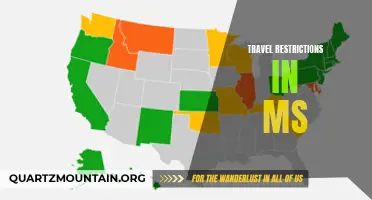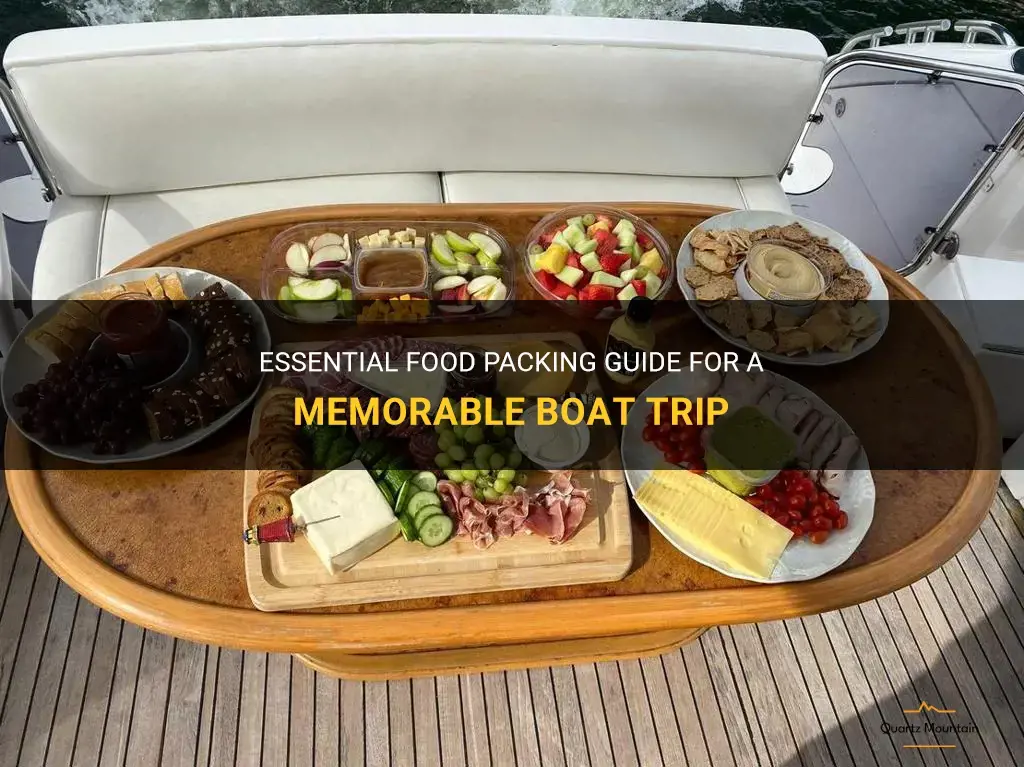
Embarking on a boat trip is an adventure like no other, where the soothing sound of crashing waves and the gentle sway of the boat create a sense of serenity and escape from the frantic pace of everyday life. However, ensuring you have enough food to sustain you throughout your voyage is crucial to make your boat trip a memorable one. With that in mind, we present to you the essential food packing guide for a memorable boat trip, guaranteeing not only a full belly but also a culinary journey on the open seas.
What You'll Learn
- What are some non-perishable food items that are ideal for packing on a boat trip?
- Are there any specific dietary concerns or restrictions that should be considered when choosing food for a boat trip?
- How can I ensure that the food I pack for a boat trip stays fresh and safe to eat?
- Are there any recommended snacks or quick meals that require minimal preparation for a boat trip?
- Are there any foods that are best to avoid packing for a boat trip due to the risk of spoilage or messiness?

What are some non-perishable food items that are ideal for packing on a boat trip?
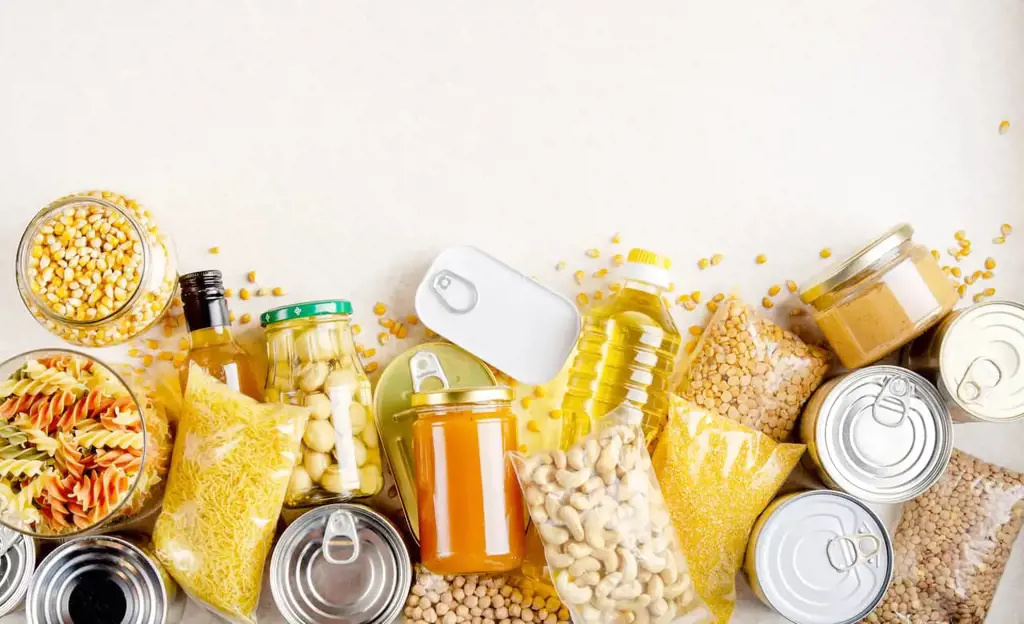
When planning a boat trip, it is important to consider the type of food items that you will need to bring along. Since refrigeration is often limited or unavailable on a boat, it is crucial to pack non-perishable food items that can withstand the elements and stay fresh for an extended period of time. Here are some ideal non-perishable food items to pack for a boat trip:
- Canned Tuna or Salmon: Canned fish is an excellent source of protein and can be easily stored on a boat. It can be enjoyed on its own or used as an ingredient in sandwiches, salads, or pasta dishes.
- Dried Fruits and Nuts: Dried fruits like raisins, apricots, and cranberries are not only delicious but also packed with essential vitamins and minerals. Nuts such as almonds, walnuts, and cashews provide a good source of healthy fats, protein, and fiber.
- Crackers or Hard Biscuits: Crackers and hard biscuits are a great choice for boat trips as they are compact, easy to store, and can be enjoyed with various spreads or toppings. Look for options with whole grains for added nutrition.
- Peanut Butter: Peanut butter is a versatile and energy-dense food that can be enjoyed on its own, spread on crackers or bread, or used as a dip for fruits and vegetables. It provides a good source of protein, healthy fats, and carbohydrates.
- Granola Bars or Energy Bars: Granola bars or energy bars are convenient snacks that can be packed in small spaces. Look for options that are high in protein and fiber to keep you feeling satisfied and energized throughout the day.
- Canned Beans or Lentils: Canned beans or lentils are excellent sources of plant-based protein and can be used to make hearty soups, stews, or salads. They are easy to store and have a long shelf life.
- Instant Oatmeal or Cereal: Instant oatmeal or cereal packets are a quick and easy breakfast option on a boat trip. They can be prepared with hot water or milk and can be customized with fruits, nuts, or honey for added flavor.
- Pasta or Rice: Pasta and rice are staple items that can be stored easily and used as a base for various meals. They can be paired with canned sauce, canned vegetables, or canned meat to create a filling and nutritious meal.
- Jerky: Beef, turkey, or salmon jerky is a high-protein snack that can be enjoyed on a boat trip. It is lightweight, easy to pack, and provides a long-lasting source of energy.
- Instant Coffee or Tea Bags: If you are a coffee or tea lover, don't forget to pack instant coffee or tea bags. These can be easily prepared with hot water and provide a comforting beverage option during your trip.
Remember to pack enough non-perishable food items to last for the duration of your boat trip. It is also important to store them in a cool and dry place to maintain their freshness. By planning ahead and packing the right non-perishable food items, you can ensure that you have a satisfying and nourishing food supply during your boat trip.
Essential Items to Pack for a Trip to Florida in December
You may want to see also

Are there any specific dietary concerns or restrictions that should be considered when choosing food for a boat trip?
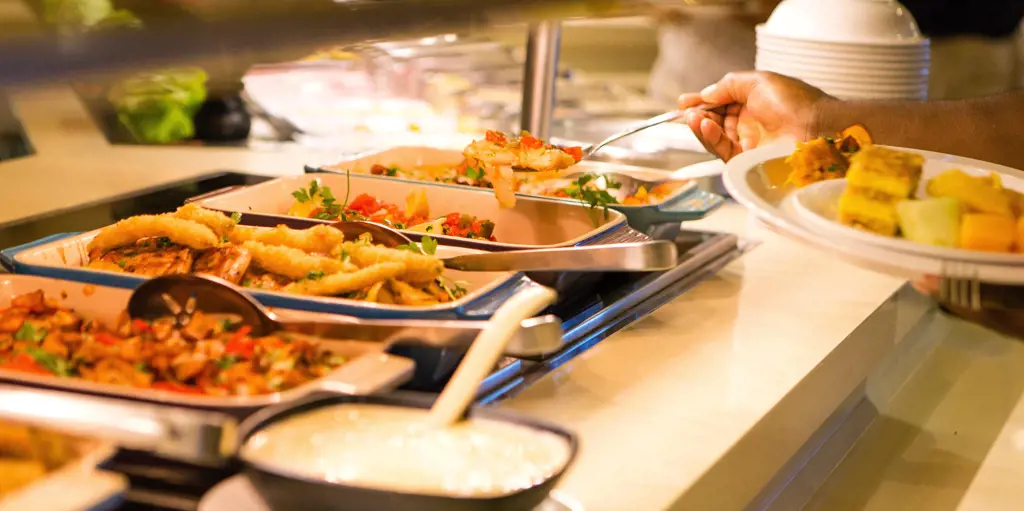
Choosing the right food for a boat trip is important to keep everyone well-fed and energized during the journey. However, there are some specific dietary concerns and restrictions that should be taken into consideration when planning meals for a boat trip.
One important factor to consider is food safety. Since boats may not have the same storage and cooking facilities as a kitchen, it is important to choose foods that can be stored safely and remain fresh for the duration of the trip. Perishable items such as meats, dairy products, and fresh produce should be kept in a cooler with plenty of ice to avoid spoilage. It is also important to follow proper hygiene practices when handling and preparing food on a boat to prevent foodborne illnesses.
Another dietary concern to consider is the nutritional needs of each individual on the boat. Some people may have specific dietary restrictions, such as allergies or medical conditions that require them to avoid certain foods. It is important to ask everyone about their dietary restrictions and preferences to ensure that everyone can eat the meals provided. This may involve planning alternative options for those with dietary restrictions or providing a variety of meal choices to accommodate different preferences.
One popular option for boat trips is to prepare pre-packaged meals or snacks that are easy to store and require minimal preparation. This can include items such as granola bars, trail mix, canned soups, and freeze-dried meals. These types of foods are lightweight, non-perishable, and can be easily stored in compact spaces. They are also convenient for snacking between activities or for quick meals on the go.
When planning meals for a boat trip, it is also important to consider the availability of cooking facilities. Some boats may have a fully equipped kitchen, while others may only have limited cooking options such as a small stove or grill. In these cases, it may be necessary to choose foods that can be easily cooked or heated using the available facilities. This can include items such as canned foods, pasta, rice, and frozen meals that can be quickly prepared.
Lastly, it is important to stock up on plenty of drinking water and beverages for the boat trip. Staying hydrated is crucial, especially when spending long periods of time under the sun and engaging in physical activities. It is advisable to bring a sufficient supply of bottled water or consider investing in a water purifier to ensure a safe and clean water source throughout the trip.
In conclusion, there are several dietary concerns and restrictions that should be taken into consideration when choosing food for a boat trip. Food safety, individual dietary restrictions, and the availability of cooking facilities are all important factors to consider. By planning ahead and choosing the right foods, everyone can enjoy a delicious and nourishing meal while enjoying their boating adventure.
Essential Items to Pack for a Stress-Free Flight Experience
You may want to see also

How can I ensure that the food I pack for a boat trip stays fresh and safe to eat?
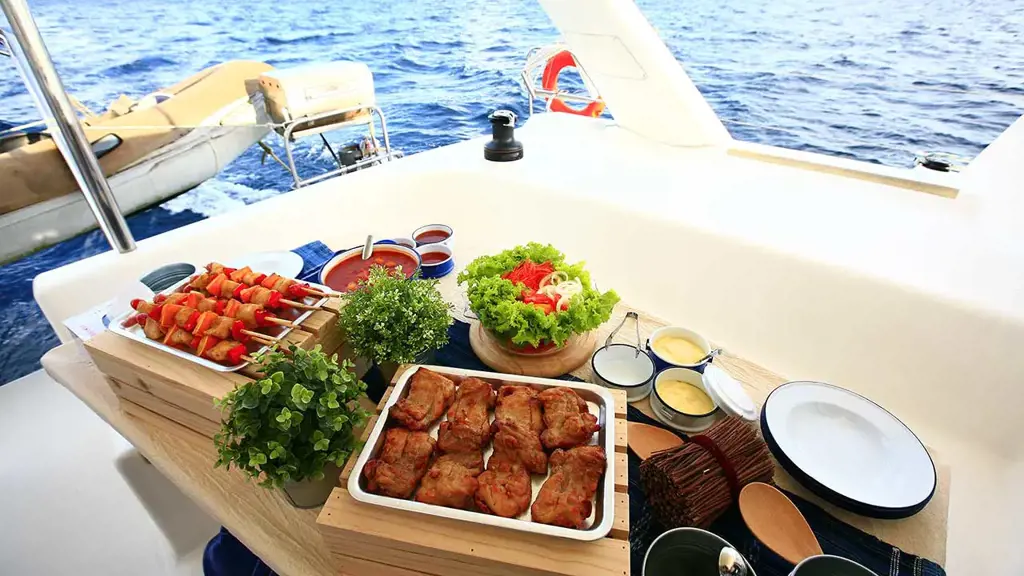
Whether you’re heading out on a day trip or embarking on a longer boating adventure, it’s important to ensure that the food you pack stays fresh and safe to eat. Proper food handling and storage is crucial to avoid foodborne illnesses and spoilage. Here are some tips to help you keep your food in top condition during your boat trip.
- Plan your meals: Before you hit the water, plan out your meals and snacks for the duration of your trip. This will help you determine what types of food you need to pack and how much. It’s best to choose foods that are easy to store and prepare, such as sandwiches, pre-cut fruits and vegetables, and individually packaged snacks.
- Use a cooler: Invest in a good quality cooler that is large enough to hold all your perishable food items. Look for a cooler with thick insulation and a tight seal to keep the temperature low and prevent the entry of warm air. Pre-chill the cooler by placing ice packs or frozen water bottles in it the night before your trip.
- Pack perishables safely: When packing perishable items such as meat, dairy products, and eggs, make sure they are stored in leak-proof containers or zip-lock bags to prevent cross-contamination. Keep raw meats separate from ready-to-eat foods to avoid the risk of bacterial contamination. Use plenty of ice or frozen gel packs to keep the temperature inside the cooler below 40°F (4°C).
- Optimize cooler space: Pack your cooler strategically to maximize space and minimize heat transfer. Start by placing a layer of ice packs or frozen bottles at the bottom of the cooler. Then, arrange your food in a way that allows for proper air circulation. Consider using separate containers for various food items to prevent them from getting crushed and to make it easier to access what you need.
- Keep the cooler closed: It’s important to resist the temptation to constantly open and close the cooler. Every time you open the lid, warm air enters and cold air escapes, causing the temperature inside the cooler to rise. Instead, pack your cooler with everything you will need for the day, and keep non-perishable items such as drinks, condiments, and snacks in a separate container.
- Monitor the temperature: Use a thermometer to regularly check the temperature inside the cooler. It should be kept below 40°F (4°C) to prevent the growth of bacteria. If the temperature rises above this threshold, add more ice or replace the ice packs to bring it back down.
- Practice safe food handling: When it’s time to eat, make sure to wash your hands thoroughly with soap and water before handling any food. Use clean utensils and cutting boards to prevent cross-contamination. If you plan to cook food on a grill or stove, ensure that it is cooked to the proper internal temperature to kill any bacteria.
- Dispose of leftovers: If you have any leftover food at the end of your trip, it’s better to discard it rather than risk foodborne illness. Bacteria can multiply rapidly in warm temperatures, so it’s best to err on the side of caution and throw away any food that has been sitting out for more than 2 hours (or 1 hour if the temperature is above 90°F or 32°C).
By following these guidelines, you can ensure that the food you pack for your boat trip stays fresh and safe to eat. Remember to always prioritize food safety and take the necessary precautions to protect yourself and your fellow boaters from foodborne illnesses.
The Essential Guide to Packing Your Luggage: What You Can (and Can't) Bring
You may want to see also

Are there any recommended snacks or quick meals that require minimal preparation for a boat trip?
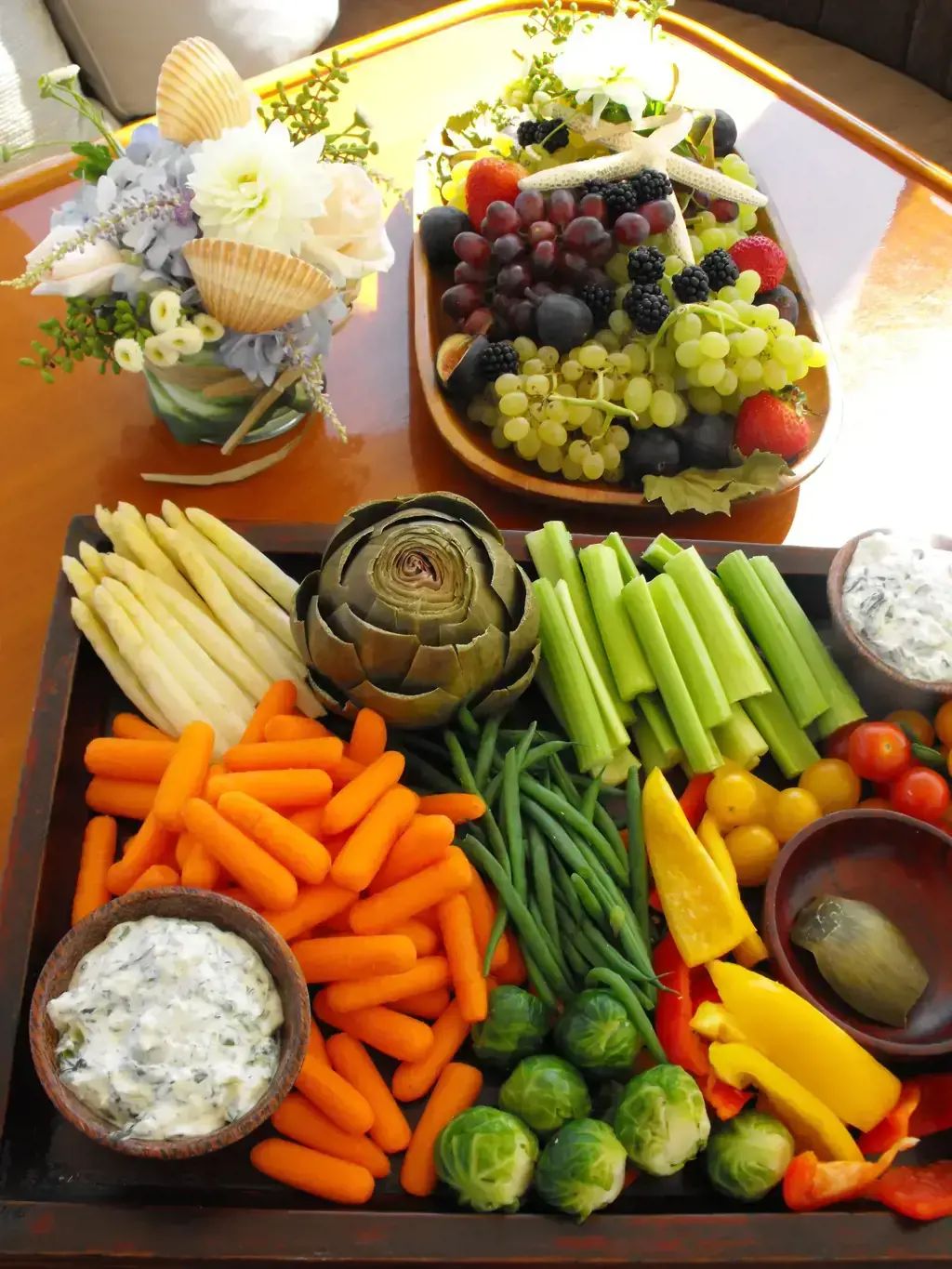
When embarking on a boat trip, it is essential to have snacks and quick meals readily available to keep everyone nourished and energized. However, preparing meals on a boat can be tricky due to limited space and resources. Luckily, there are several recommended snacks and quick meals that require minimal preparation and are perfect for enjoying out on the water.
Sandwiches and Wraps:
Sandwiches and wraps are a go-to option for boat trips as they are easy to assemble and can be customized to everyone's liking. Fillings such as deli meats, cheese, lettuce, and tomatoes are classic choices. Wraps are also a great option as they are less likely to get soggy compared to traditional sandwiches.
Fruit and Vegetable Platters:
Preparing a platter with a variety of fruits and vegetables is a refreshing and healthy option for a boat trip. Cut up fruits like watermelon, pineapple, berries, and grapes into bite-sized pieces for easy snacking. For vegetables, carrot sticks, cherry tomatoes, and cucumber slices are excellent choices.
Cheese and Crackers:
A selection of cheese and crackers is another simple yet satisfying option for a boat trip. Pack a variety of cheeses such as cheddar, Swiss, and gouda, along with different types of crackers. This snack requires no prep work and can be enjoyed by everyone on board.
Trail Mix and Nuts:
Trail mix is a convenient and portable snack that provides a mix of energy-boosting ingredients. Make your own trail mix by combining nuts, dried fruits, and a sprinkle of chocolate or yogurt-covered treats. Alternatively, pre-packaged mixed nuts are readily available and require no additional preparation.
Hummus and Veggie Sticks:
Hummus is a versatile dip that pairs perfectly with fresh vegetable sticks. Carrots, celery, bell peppers, and cucumber sticks can be pre-cut and stored in airtight containers. Simply pack some hummus and enjoy a healthy and satisfying snack while cruising on the boat.
Pre-Cooked Pasta Salad:
Pre-cooked pasta salad can be prepared ahead of time and stored in the refrigerator until ready to eat. Cook pasta of your choice and toss it with vegetables, meats, and a dressing of your choice. Pasta salads are filling and can be enjoyed cold or at room temperature.
Energy Bars and Protein Shakes:
For a quick and convenient snack, energy bars and protein shakes are great options. There are a wide variety of bars available, ranging from fruit-based bars to those packed with nuts and seeds. Protein shakes can be prepared using a portable blender or pre-made options can be purchased.
Remember to pack these snacks and quick meals in portable containers to keep them fresh and easily accessible during the boat trip. Additionally, it is important to stay hydrated, so be sure to bring plenty of water and other beverages of your choice. By having these recommended snacks and quick meals on hand, you can enjoy a delicious and hassle-free dining experience while cruising on the boat.
Packing Essentials: How to Pack Efficiently for a Week
You may want to see also

Are there any foods that are best to avoid packing for a boat trip due to the risk of spoilage or messiness?
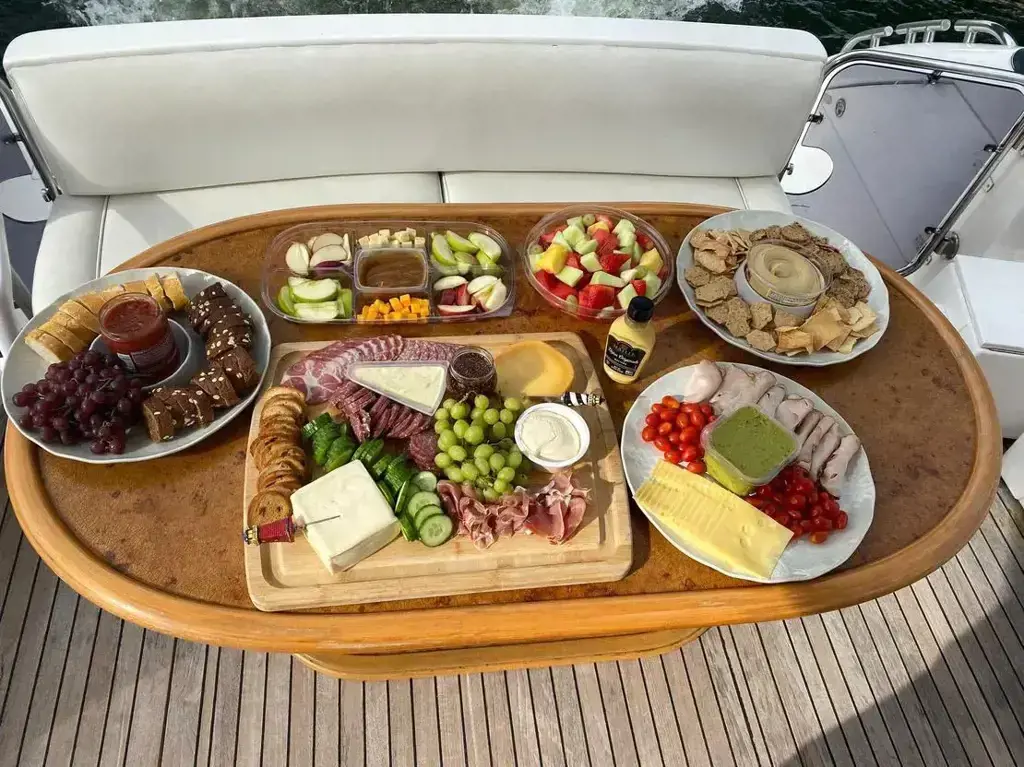
When going on a boat trip, it's important to plan your meals and snacks carefully to avoid any potential food spoilage or messiness. Being on a boat means you're dealing with the elements, limited storage space, and sometimes rough conditions, so it's best to avoid certain types of foods that may not hold up well under these circumstances. Here are some foods that you should consider leaving behind when packing for your next boat adventure:
- Fresh dairy products: As delicious as cheese, yogurt, and milk are, they can be prone to spoilage when not properly refrigerated. The heat and lack of refrigeration on a boat can cause these products to go bad quickly, leading to a potential risk of foodborne illness. Instead, opt for shelf-stable alternatives like powdered milk or individually packaged cheese sticks.
- Raw meats and seafood: Raw meats and seafood require careful handling and refrigeration to prevent bacterial growth. While freshly caught fish may sound tempting, it's best to leave it behind unless you have proper refrigeration facilities on the boat. Instead, choose pre-cooked or canned options like canned tuna or chicken for your protein needs.
- Delicate fruits and vegetables: Fruits and vegetables that are easily bruised or crushed may not hold up well during a boat trip. Apples, oranges, and bananas are sturdier options that can withstand some rough handling. Alternatively, consider packing dehydrated fruits or freeze-dried vegetables that are lightweight, compact, and have a long shelf life.
- Crumbly or messy foods: Foods that crumble easily or make a mess can be difficult to clean up on a boat, especially if there are high winds or rough seas. Avoid foods like chips, crackers, and cookies that can leave behind crumbs and create a mess. Instead, choose more contained snacks like granola bars, trail mix, or dried fruit.
- Fragile condiments: Condiments such as glass bottles of ketchup, mayonnaise, or salad dressings can easily break during a boat trip, creating a sticky and potentially hazardous mess. Opt for single-serve packets or plastic squeeze bottles to minimize the risk of spills and broken glass.
- Foods with strong odors: Being in close quarters on a boat means that strong-smelling foods can quickly become overwhelming. Avoid packing foods like strong cheeses, onions, or garlic that can permeate the entire boat and disturb other passengers. Opt for milder options or consider using spices and herbs to add flavor without the strong odor.
- Perishable items that require constant refrigeration: While some boats may have refrigeration facilities, it's best to avoid packing perishable items that require constant refrigeration like fresh salads, sushi, or uncooked eggs. Opt for non-perishable alternatives such as canned or dried foods that can withstand the lack of refrigeration.
- Beverages in glass bottles: Just like fragile condiments, glass bottles of beverages can break easily on a boat, creating a mess and potential safety hazard. Choose beverages in plastic bottles or cans to minimize the risk of spills and broken glass.
When packing for a boat trip, it's always important to consider the storage limitations, potential for spoilage, and messiness of certain foods. By planning your meals and snacks wisely, you can ensure a safe and enjoyable experience on the water without compromising on delicious and convenient food options.
What to Pack for a Trip to Florida in April
You may want to see also
Frequently asked questions
When packing food for a boat trip, it is important to bring non-perishable items that are easy to store and prepare. Canned foods such as beans, soup, and tuna are great options, as are dried fruits, nuts, and granola bars. Don't forget to bring plenty of water and beverages to stay hydrated during your trip.
While it is possible to bring fresh fruits and vegetables on a boat trip, they may not last as long as non-perishable items. Opt for fruits and vegetables that have a longer shelf life, such as apples, oranges, and carrots. Alternatively, you can bring pre-cut and pre-packaged fruits and vegetables that are sealed to keep them fresh.
To prevent food from spoiling on a boat trip, it is important to store it properly. Use coolers or insulated bags with ice packs to keep perishable items like meats and dairy products cold. Keep the cooler in a shaded area and avoid opening it frequently to maintain the desired temperature. Plan your meals ahead of time to reduce food waste and ensure everything gets consumed before it spoils.
Yes, it is a good idea to bring utensils and plates for your boat trip. Pack reusable or disposable cutlery, plates, and cups, along with napkins and paper towels for convenience. You may also want to bring a can opener, a sharp knife, and a plastic cutting board for those canned and fresh food items that require preparation.
It is important to consider any dietary restrictions or food allergies when packing for a boat trip. If someone in your group has a specific diet, make sure to bring appropriate food options for them. Additionally, be mindful of potential food safety concerns, such as storing raw and cooked foods separately and keeping everything properly chilled to avoid foodborne illnesses.






